Preserving a piece of black history in Montopolis
At center of a debate: A former school for Negro children
 (Austin Monthly) On a sweltering summer morning, Fred McGhee surveys an old schoolhouse in the middle of a meadow along Montopolis Drive. The paint is peeling, and overgrown vegetation makes the place hard to see from the road. There’s evidence that someone has recently taken up residence in what appears to be a small storage area.
(Austin Monthly) On a sweltering summer morning, Fred McGhee surveys an old schoolhouse in the middle of a meadow along Montopolis Drive. The paint is peeling, and overgrown vegetation makes the place hard to see from the road. There’s evidence that someone has recently taken up residence in what appears to be a small storage area.
Despite the building’s dilapidated appearance, McGhee radiates enthusiasm. As he rattles off facts about the area, he struts around the property as though showing off an old family treasure. “We consider the Montopolis School for Negro Children to be an iconic, venerated, spiritual place,” he says. “It’s a cornerstone of the community.” Founded in 1891, the school’s original location was just north of Bastrop Highway. After a storm washed the structure away in 1935, the school found a new home in an army barracks that was moved to the present location. It remained a school until 1962. (more)
The roots of black Thanksgiving: Why mac and cheese and potato salad are so popular
 (The Washington Post) A year ago, I wrote a humorous piece about Thanksgiving based on a virally successful satirical guide to attending a predominantly black barbecue. I wanted to give readers of my blog a laugh while asking a serious question: Are the foods and other cultural traditions that mark African American Thanksgiving dinners just as different? “How to Survive Black Thanksgiving as a Non-Black Guest” was a hit because, much like the piece it was based on, it confronted, head on, ideas about the unspoken rules and understandings of our collective food culture.
(The Washington Post) A year ago, I wrote a humorous piece about Thanksgiving based on a virally successful satirical guide to attending a predominantly black barbecue. I wanted to give readers of my blog a laugh while asking a serious question: Are the foods and other cultural traditions that mark African American Thanksgiving dinners just as different? “How to Survive Black Thanksgiving as a Non-Black Guest” was a hit because, much like the piece it was based on, it confronted, head on, ideas about the unspoken rules and understandings of our collective food culture.
It made me realize that we lack a vocabulary that other ethnic groups have for the feelings and meanings behind, as one person put it, “how we be.” There should be, but there is no, African American version of Michael Pollan’s “Food Rules.” American ethnic groups have different versions of the same social slips, family politics and awkward moments – so that’s not unique. What is special is the approach to the foods of African American Thanksgiving meals and the ideas and history behind them. (more)
Related: Bound to the Fire: How Virginia’s Enslaved Cooks Helped Invent American Cuisine
Umoja Karamu: The Other Thanksgiving
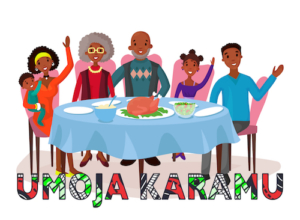 (Huffington Post) Umoja Karamu (pronounced You-mo-ja Care-a-moo) are Kiswahili words that mean “unity feast.” Celebrated on the fourth Sunday of November it is a ceremony of unity that highlights events and periods that have shaped the African American family. This year it will be celebrated on November 26th.
(Huffington Post) Umoja Karamu (pronounced You-mo-ja Care-a-moo) are Kiswahili words that mean “unity feast.” Celebrated on the fourth Sunday of November it is a ceremony of unity that highlights events and periods that have shaped the African American family. This year it will be celebrated on November 26th.
Like Kwanzaa, a popular holiday celebrated after Christmas by African American families in the United States, Umoja Karamu is becoming an alternative holiday for African American families who want to distance themselves from the European Thanksgiving.
Umoja Karamu is a ritual for the Black family that was developed to create new meaning and solidarity through ceremony and symbolism. Thanksgiving, although a tradition for most Americans, African Americans have a alternative to celebrate family along with their own heritage. (more)
New book presents 100 inspiring, unsettling facts about black history
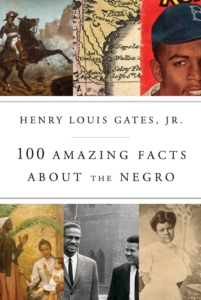
Henry Louis Gates Jr.’s fascinating new book was inspired by a 1934 work by the pioneering black journalist Joel Augustus Rogers.
(The Seattle Times) If you’ve been following Henry Louis Gates, his PBS work and the columns he wrote on The Root, the website that he and former Washington Post owner Donald Graham founded, you are probably familiar with some of the amazing facts Gates has collected in this volume. It’s a fun book that, in no particular order, asks and answers questions about ancient history (tradition has it that Balthasar, one of the three wise men, was the first black person to see Jesus), Afro-European history (Russian Emperor Peter the Great had an African godson, Abram Gannibal) and Afro-Latin history (Argentina deliberately sought to wipe out its black population as a “policy of covert genocide”). Indeed, this book is global time travel, looking at history through the lens of African-American lives. (more)
TIPHC Bookshelf
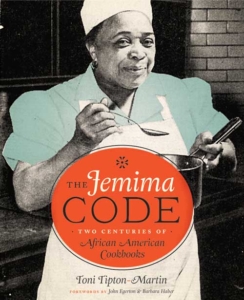 Published scholarship on black history in Texas is growing and we’d like to share with you some suggested readings, both current and past, from some of the preeminent history scholars in Texas and beyond. We invite you to take a look at our bookshelf page – including a featured selection – and check back as the list grows. A different selection will be featured each week. We welcome suggestions and reviews. This week, we offer, “The Jemima Code,” by Toni Tipton-Martin.
Published scholarship on black history in Texas is growing and we’d like to share with you some suggested readings, both current and past, from some of the preeminent history scholars in Texas and beyond. We invite you to take a look at our bookshelf page – including a featured selection – and check back as the list grows. A different selection will be featured each week. We welcome suggestions and reviews. This week, we offer, “The Jemima Code,” by Toni Tipton-Martin.
Women of African descent have contributed to America’s food culture for centuries, but their rich and varied involvement is still overshadowed by the demeaning stereotype of an illiterate “Aunt Jemima” who cooked mostly by natural instinct. To discover the true role of black women in the creation of American, and especially southern, cuisine, Toni Tipton-Martin has spent years amassing one of the world’s largest private collections of cookbooks published by African American authors, looking for evidence of their impact on American food, families, and communities and for ways we might use that knowledge to inspire community wellness of every kind.
The Jemima Code presents more than 150 black cookbooks that range from a rare 1827 house servant’s manual, the first book published by an African American in the trade, to modern classics by authors such as Edna Lewis and Vertamae Grosvenor. The books are arranged chronologically and illustrated with photos of their covers; many also display selected interior pages, including recipes. Tipton-Martin provides notes on the authors and their contributions and the significance of each book, while her chapter introductions summarize the cultural history reflected in the books that follow. These cookbooks offer firsthand evidence that African Americans cooked creative masterpieces from meager provisions, educated young chefs, operated food businesses, and nourished the African American community through the long struggle for human rights. The Jemima Code transforms America’s most maligned kitchen servant into an inspirational and powerful model of culinary wisdom and cultural authority.
This Week in Texas Black History, Nov. 19-25

Nov23
On this day in 1963, Baylor University’s athletic council announced it would integrate all of the school’s athletic teams, effective with the opening of the spring semester, Jan. 30, 1964. At the time, the school had no black students, but had announced its intention to open enrollment. John Bridgers, head football coach and athletic director said, “We don’t know of any Negro athletes right now that we’re interested in, but there may be some we will want to look at and investigate…there are some tremendous Negro athletes all over the country.” Bridgers said he personally agrees with the action of the trustees and the athletic council. “I feel it’s something that should be, from a standpoint of being right.” Ironically, Baylor was the first program in the Southwest Conference to have a black player take the field when running back John Westbrook, a walk-on, carried the ball twice in the Bears victory over Syracuse University on Sept. 10, 1966. A week later, Southern Methodist University‘s Jerry Levias became the SWC’s first black scholarship player.
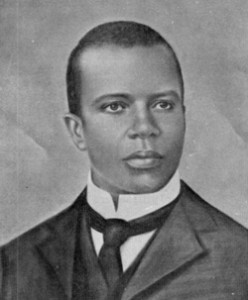
Scott Joplin
Nov24
Called the “King of Ragtime,” Scott Joplin was born this day in 1868 near Linden, Texas. (Some documents, however, refer to his birth as between June 1867 and mid-January 1868.) Joplin grew up in Texarkana, Texas and taught himself to play piano in the home where his mother worked as a domestic. Sheet music for his best-known piece, “Maple Leaf Rag,” sold over a million copies and his works also include a ballet and two operas. Joplin’s music was featured in the 1973 motion picture, “The Sting,” which won an Academy Award for its film score. In 1976, Joplin was posthumously awarded a Pulitzer Prize for “Treemonisha,” the first grand opera by an African American.

Teddy Wilson
Nov24
Jazz pianist Teddy Wilson was born this day in Austin in 1912. Known as “the definitive swing pianist,” Wilson began his career in the late 1920s in various Midwest bands, and from 1935 to 1939, played on sessions that resulted in legendary vocalist Billie Holiday‘s greatest work. He joined Benny Goodman in 1936, breaking the color barrier by performing on an equal footing with Goodman in trios, quartets and sextets. He is best known for his role as “Sam” in the Humphrey Bogart classic movie, “Casablanca,” in which he is the piano-player and singer (“As Time Goes By“) and the target for the line, “Play it (again, Sam)!”
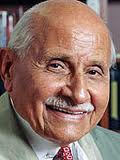
Percy Sutton
Nov24
Attorney, businessman and civil rights activist Percy Sutton was born on this date in 1920 in San Antonio. The son of a former slave, Sutton served in World War II with the Tuskegee Airmen, then settled in New York. In 1971, he co-founded the Inner City Broadcasting Corporation, which purchased WLIB-AM, making it the first black-owned station in New York City. He earned a law degree in 1950 and served in the New York State Assembly before taking over as Manhattan borough president in 1966, becoming the state’s highest-ranking black elected official. Sutton also headed a group that owned the Amsterdam News, the second-largest black weekly newspaper in the country.
Blog: Ron Goodwin, Ph.D., author, PVAMU history professor
Ron Goodwin’s bi-weekly blog appears exclusively for TIPHC. Goodwin is a San Antonio native and Air Force veteran. Generally, his column addresses contemporary issues in the black community and how they relate to black history. He and the TIPHC staff welcome your comments.
Latest Entries
A New Hope
Forgive me for borrowing the title of one of the most profitable films in history, “Star Wars: A New Hope.” I’ve always been enamored by space. I’m a child of the 1960s and I remember playing with my Major Matt Mason action figure (not a doll!) as my family [...]
Tell me the truth
Democracy – a) government by the people, b) a government in which the supreme power is vested in the people and exercised by them, directly or indirectly through a system of representation usually involving periodically held free elections. Merriam-Webster Dictionary There were many things I learned from my father. [...]
Submissions Wanted
Historians, scholars, students, lend us your…writings. Help us produce the most comprehensive documentation ever undertaken for the African American experience in Texas. We encourage you to contribute items about people, places, events, issues, politics/legislation, sports, entertainment, religion, etc., as general entries or essays. Our documentation is wide-ranging and diverse, and you may research and write about the subject of your interest or, to start, please consult our list of suggested biographical entries and see submission guidelines. However, all topics must be approved by TIPHC editors before beginning your research/writing.
We welcome your questions or comments. Please contact Mr. Michael Hurd, Director of TIPHC, at mdhurd@pvamu.edu.
